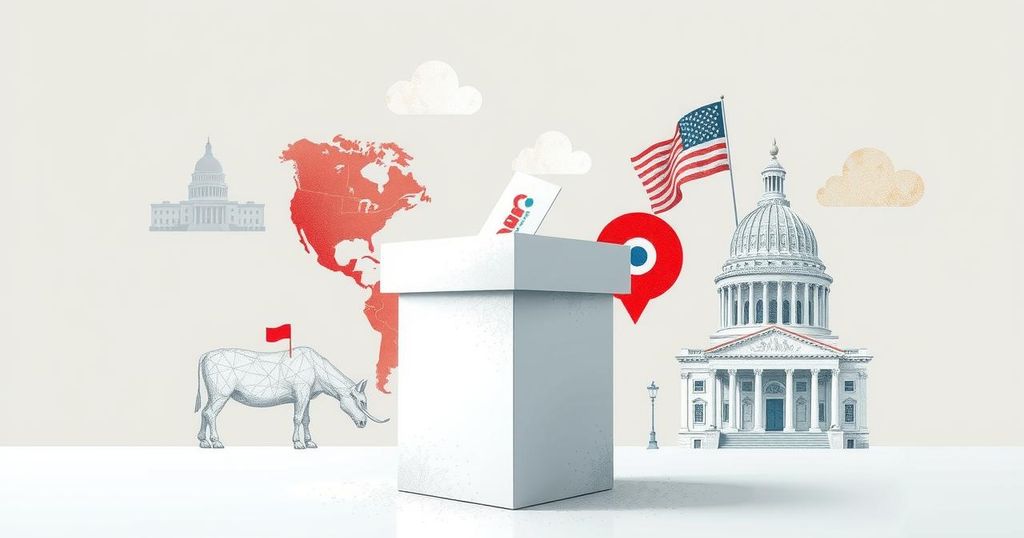World news
2024 ELECTIONS, AFRICA, ALI BONGO ONDIMBA, BILLBOARD, BR, BRICE OLIGUI NGUEMA, COMMITTEE FOR THE TRANSITION AND RESTORATION OF INSTITUTIONS, CORRUPTION, CT, ELECTIONS, GABON, INTERIOR MINISTRY, LIBREVILLE, NATIONAL ASSEMBLY, OLIGUI, POLITICS, UNION NEWSPAPER, VOTER TURNOUT
Daniel O'Connor
0 Comments
Gabon’s Referendum Results Indicate Strong Support for New Constitution
Gabon’s military rulers announced that a new constitution was provisionally approved by 91.8% of voters. The constitution introduces presidential term limits and other parameters regarding candidate eligibility, while turnout was reported at 53.54%. The referendum process has been described as heavily influenced by official propaganda, raising questions about its integrity and the broader political implications.
Gabon’s military leaders have claimed that a new constitution has received overwhelming approval in a recent referendum, as indicated by provisional results. Approximately 860,000 registered voters were encouraged by authorities to participate, either opting for a green ballot for “yes” or a red one for “no.” The constitution proposes a presidential term limit of two seven-year terms, eliminates the position of prime minister, and prohibits dynastic succession.
The Committee for the Transition and Restoration of Institutions (CTRI) announced that 91.8 percent of voters supported the new constitution. However, voter turnout was reported at 53.54 percent, falling short of earlier estimates of 71 percent. Voting proceeded without major incidents across 2,835 polling stations open until 6:00 PM, despite a government-imposed night curfew.
The proposed constitution also mandates that presidential candidates be Gabonese nationals with at least one Gabon-born parent and a Gabonese spouse, disqualifying former President Ali Bongo Ondimba and his family. Transitional President Brice Oligui Nguema hailed the referendum as a substantial progress, emphasizing the transparency of the voting process as he engaged with voters at a school in Libreville.
The referendum campaign has been criticized for being heavily influenced by government propaganda and raising concerns about the legitimacy of the electoral process. Local media highlighted a pervasive atmosphere that could conflate the referendum with a prelude to potential presidential campaigning by the junta.
Voting lines appeared at polling stations under the watchful eye of military personnel, with citizens like Nathalie Badzoko expressing their support for the junta, despite acknowledging a lack of familiarity with the complete legal text. Critics of the constitution argue it is designed to consolidate power for a future dictatorship.
The scrutiny of civil governance, emerging from corruption allegations against Ali Bongo, has motivated reform discussions amid job concerns, rising living costs, and security issues. A recent Afrobarometer survey indicated that many citizens feel positively about the country’s trajectory, with over 46% expressing confidence in President Oligui’s leadership.
Gabon is experiencing a significant transition following a coup last August that overthrew former President Ali Bongo Ondimba. The country’s military rulers have initiated a process to establish a new constitutional framework, which emphasizes democratic reforms, limits presidential terms, and redefines eligibility for presidential candidates. The proposed constitution has precipitated a national referendum, with implications for Gabon’s political landscape, especially regarding future elections and governance standards. Public sentiment has been gauged through surveys, reflecting the populace’s concerns and aspirations following years of perceived corruption and mismanagement under the previous regime.
The provisional results of Gabon’s referendum indicate substantial support for the new constitution advocated by the military government, with indications of a desire for political transformation among the populace. However, significant concerns regarding the legitimacy of the electoral process and the implications of the proposed changes persist. The political narrative is complicated by the potential for authoritarianism under the current leadership, necessitating careful scrutiny as Ghana moves forward in establishing its new governance framework.
Original Source: www.tiogapublishing.com




Post Comment